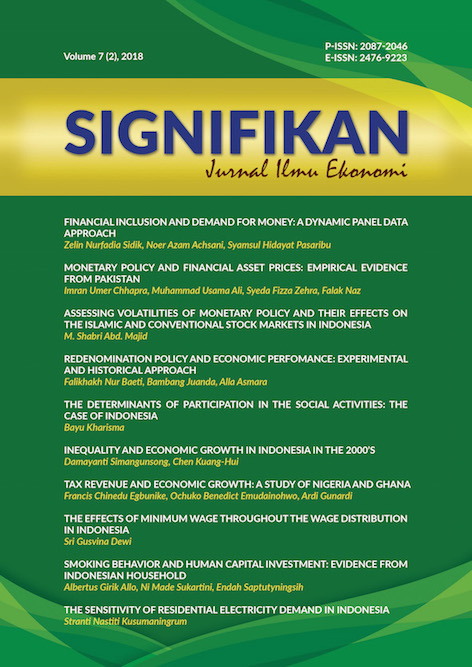Redenomination Policy and Economic Performance: Experimental and Historical Approach
DOI:
https://doi.org/10.15408/sjie.v7i2.6568Keywords:
economic experimental, economic performance, logistic regression, redenominationAbstract
The discourse of redenomination policy has existed since 2010. This research analyzes impact of economic growth, type of goods, transitions period and redenomination stages towards economic performance which measured from the change in the price of transactions and the number of transactions. This research used primary data and secondary data; the primary data was collected through experimental economy. The percentage of the change in price of transactions after redenomination in low economic growth condition showed an increase, while in high economic growth condition showed a decrease. Secondary data was gathered to analyze the deciding factor in the success of redenomination through logistic analysis method. The result showed that the variable of economic growth, unemployment rate and the level of democratization in a country affect the success of the implementation of redenomination
References
Astrini, D. A. (2014). The Impact of Redenomination on Economic Performance: Experimental and Historical Approach. (Unpublished Thesis). Bogor: Bogor Agricultural University.
Dzokoto, V., Edwin, C., Maxwell, T., & Annabella, O. (2010). Deceiving Our Minds: A Qualitative Exploration of the Money Illusion in Post-redenomination Ghana. Journal Of Consumer Policy. Vol. 33(4): 339-353. doi: https://doi.org/10.1007/s10603-010-9144-3.
Hobijn, B., Ravena, F., & Tambalotti, A. (2006). Menu Costs at Work: Restaurant Prices and the Introduction of the Euro. The Quarterly Journal of Economics. Vol. 121 (3): 1103-1131. doi: https://doi.org/10.1162/qjec.121.3.1103.
Juanda, B. A. (2009). Metodologi Penelitian Ekonomi dan Bisnis (Research Methodology fro Economics and Business). Bogor: IPB Press.
Juanda, B. A. (2011). Ekonomi Eksperimental untuk Pengembangan Teori Ekonomi dan Pengkajian Suatu Kebijakan (Experimental Economics for Development of Economic Theory and Assessment of a Policy). Bogor: IPB Press.
Mahardika, H., Agung, Y., & Erita, N. (2015). Adapting to Zeroes: Investigating The Need for a Transition Period in The Proposed Rupiah Redenomination plan. Journal International Business and Entrepreneurship Development. Vol. 8(4): 1-16. doi: https://doi.org/10.1504/JIBED.2015.072925.
Mattjik, A. A., & Sumertajaya, I. M. (2002). Experimental Design with SAS and MINITAB Applications. Bogor: IPB Press.
Mehdi, S., & Motiee, R. (2012). An Investigating Zeros Elimination of the National Currency and Its Effect on National Economy (Case study in Iran). European Journal of Experimental Biology. Vol. 2 (4):1137-1143
Mosley, L. A. (2005). Dropping Zeros, Gaining Credibility? Currency Redenomination in Developing Nations. Working Paper of Annual Meeting of The American Political Science Association, Washington DC.
Pambudi, A., Bambang, J & Priyarsono, D. (2015). Determinants of Redenomination Currency Hygiene: Historical and Experimental Approach. Bulletin of Monetary and Banking Economy. Vol. 2 (1): 1-30.
Zidek, L., &Michal, C. (2015). Impact Currency Redenomination On Inflation Case Study Turkey. Asian Economic an Financial Review. Vol. 5(6): 908-914


